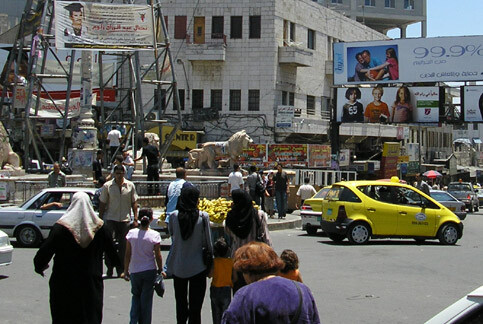Palestinian Center for Human Rights 26 August 2004

The main square of Ramallah during summer. (Arjan El Fassed)
The Israeli Occupation Forces (IOF) have continued with their attacks on the occupied Palestinian territory (oPt). These attacks cost the lives of six Palestinian civilians, including one child, and injured many others, some of them seriously. The attacks also involved the demolition of wide scale areas of land and of a number of homes.
The IOF also arrested dozens of civilians in their houses and at checkpoints and international passages. The IOF made a number of incursions into Palestinian residential areas under cover from random shelling. The incursions were characterized by the use of excessive military force.
The attacks were made against the background of continuous closures imposed across the oPt and around residential areas. These attacks have also been paralleled with the continuing hunger strike of 4500 Arab and Palestinian prisoners, in Israeli jails, who are trying to pressurise the occupation authorities to improve their living conditions in line with international standards, including the Fourth Geneva Convention.
The IOF attacks in the Gaza Strip caused the death of five civilians. Later a sixth Palestinians died effected by injuries from a previous attack. He was injured during an attempted extra-judicial execution on Sheik Ahmed al-Jabari, a leader in the Hamas movement. The other five victims were killed by random shelling in residential areas on the 19th ,20th and 23rd of August. Two civilians were killed in Rafah and a third in al Qarara, to the north east of Khan Yunis, where he was left bleeding to death. The other two victims were killed by excessive use of force by IOF.
One of them was killed on the 21st of August, in Nusserait, he was suffering from a psychological disorder while the other victim was killed on the 23rd , in Rafah. The IOF conducted seven incursions in different areas of the Gaza Strip. Three of these incursions took place on the 19th of August in al Salam neighbourhood, in Rafah, where two homes were demolished. The two homes were shelters fro three families, totalling 26 people. In Khan Yunis four civil and industrial facilities in Block I of the Refugee Camp were destroyed. They also demolished eight homes in Khan Yunis, where 15 families lived, about 100 people in total.
In Wadi Sulqa village, to the south east of Deir al Balah city, they razed 60 donums of agricultural land. On the 25th of August the fourth incursion took place in al Moraqa village, south of Gaza City. They demolished five houses, three of them completely. The homes provided shelter for four families, comprising 28 people.
In the West Bank, the IOF continued their incursions and attacks in all of the West Bank governorates. Nablus was subjected to an ongoing incursion, although no fatalities were reported. However the excessive use of force caused a number of injuries to Palestinian civilians. During these incursions the Israeli troops blew up one house in Yatma village, south of Nablus and arrested dozens of civilians, who were taken to unspecified locations.
During the week the PCHR fieldworkers documented a number of attacks committed by IOF against medical institutions and their employees.
Also the Israeli settlers living in the oPt, in contravention of international humanitarian law ( particularly the Fourth Geneva Convention) conducted a series of systematic attacks against Palestinians and their properties. These attacks came against the background of the Israeli government plan to build another 533 housing units in settlement areas located inside the West Bank.
In respect of the Annexation Wall in the West Bank the IOF have continued to destroy the main road connecting Ramallah and Jerusalem. This part of the wall will isolate al Ram village and encompass it into West Bank territory. The industrial area known as “Aderot”, which is part of the oPt, north of the wall will be annexed to Israel. This part of the wall will force the closure of 450 commercial units located along this closed road, as well as 11 educational institutions in al Ram, where 4000 Palestinian students are studying. It will also prevent 20,000 civilians who hold Jerusalem identity cards from entering the old City of Jerusalem.
The IOF have continued to impose severe closures on the oPt and restricted the movement of Palestinian civilians. In the Gaza Strip the IOF have continued with systematic violations of the right to freedom of movement of people and goods. They closed the Erez and Qarni checkpoints, leading into Israel. Despite the reopening of Rafah International Terminal many Palestinian travellers are still suffering from the limited opening hours being imposed by the IOF. The IOF intensified its restrictions on the movement of civilians on the internal checkpoints, particularly at al Matahen and Abu Houli on Salah al Din street, linking the north and south of the Gaza Strip.
In the West Bank the IOF have continued to impose more restrictions on the movement of Palestinian civilians through the use of fixed and spontaneous checkpoints at city entrances or secondary roads between districts. The closures were particularly applied on the main days which Palestinians use to travel to and from home or places of work, Saturday and Thursday.
More restrictions were imposed on those wishing to pray at al Aqsa Mosque in Jerusalem as a heavy police presence prevented civilians from entering Jerusalem. Similar restrictions were imposed in Hebron.
To download the full report click here.
Related Links